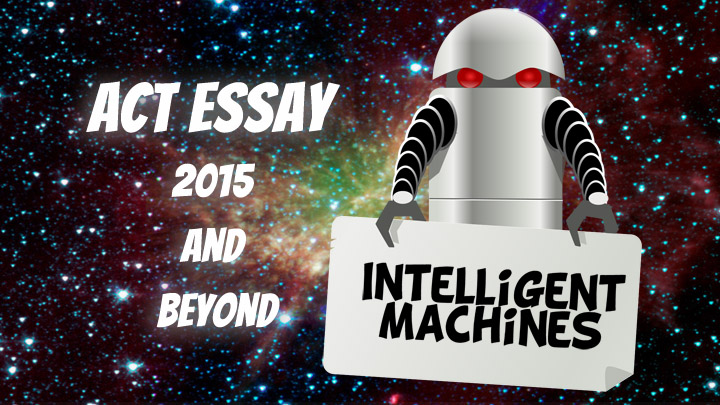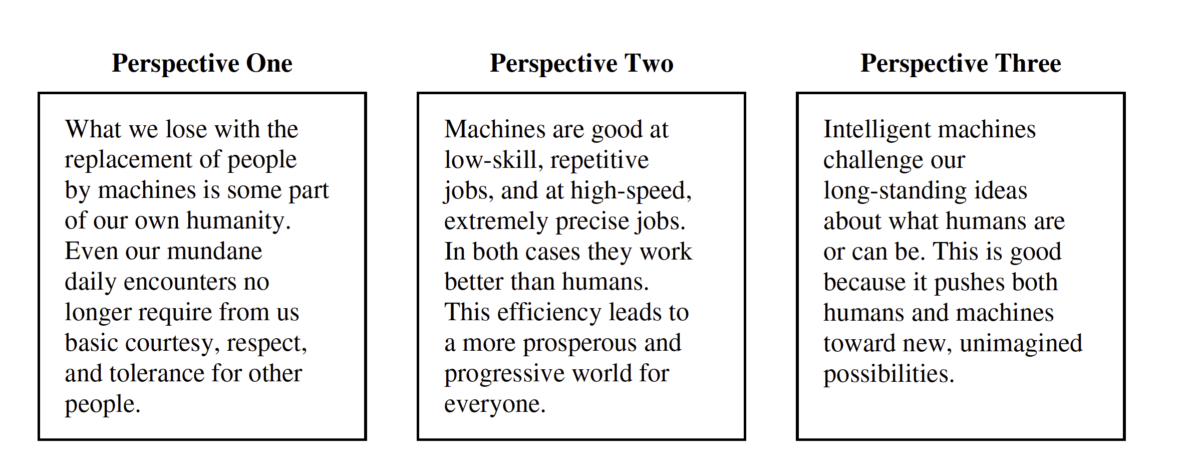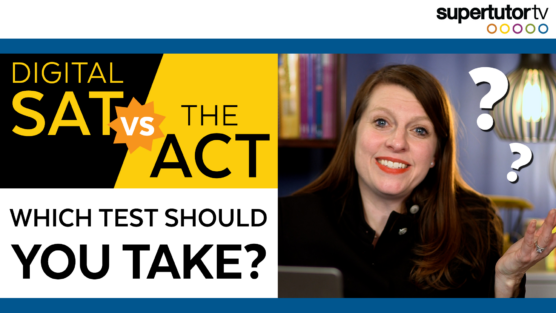The ACT announced that its essay is changing in the fall of 2015 (that means now!).
Though the new essay still requires students to take a side on an issue, the issues are no longer narrow topics that apply to the lives of high school students, such as whether students should wear uniforms or be allowed to drive at age 16. Rather, the new essay in some ways resembles the abstract nature of the pre-2016 SAT essay, which asks students to draw upon their own “knowledge, experience and values” to narrow the scope of a somewhat abstract topic delineated into three given “perspectives.” The prompt itself is a page long and then some.
The new essay task is far more complex and challenging to address, and many students may be at a loss for how to do so given the recent nature of the change. So let’s take a look at the official example essay released by ACT and step through an example essay.
Writing a successful essay requires breaking down the prompt, and that’s what I will show you how to do below:
Let’s break down how to start and structure your essay, based on the highest scoring released essay from the ACT folks.
Intelligent Machines*
Many of the goods and services we depend on daily are now supplied by intelligent, automated machines rather than human beings. Robots build cars and other goods on assembly lines, where once there were human workers. Many of our phone conversations are now conducted not with people but with sophisticated technologies. We can now buy goods at a variety of stores without the help of a human cashier. Automation is generally seen as a sign of progress, but what is lost when we replace humans with machines? Given the accelerating variety and prevalence of intelligent machines, it is worth examining the implications and meaning of their presence in our lives.
Identify your specifics:
This part of the prompt gives you a sliver of specifics. You can use those specifics to avoid getting buried in the abstracts of the perspectives to come. Ideally, you will add your own specifics that are DISTINCT from these given but fit in the same category– examples that echo your own experience, but are similar in nature. You can also use these specifics if you like, but your essay will feel flat if these are the only examples you have.
Take notes on what you’re given specifically (i.e. in terms of something CONCRETE) and think about what they have in common:
–automated phone conversations
–checkouts sans cashiers
Then summarize for yourself:
To me, these are instances of machines replacing people in the workplace or in some sort of job– that’s the kind of example I’m going to use in my essay.
Identify the question:
You should also take notes on what the QUESTION is:
Automation — is it a means of progress or a source of loss?
My thesis needs to come down on one side or the other of this question, or I can take a more qualified position (in this case it is a means of progress, but in this other case it is a source of loss, etc.). In any case it’s best if you find a way to be a little bit GRAY with your argument– i.e. agree a little bit with the other side in some way, but make it clear what side you are on, and be certain whether the benefits outweigh the drawbacks or vice versa.
Next up we’ve got the three perspectives:
Notice how abstract these are. Yay! Abstract!
Your best move on the perspectives is to take enough time to understand what these perspective mean. Don’t read too fast– really try to get what the perspective is trying to say.
Summarize each point of view:
P1: Machines make us lose a bit of our human-ness– our kindness / tolerance / respect, all that jazz.
P2: Efficient machines are better suited than humans for some specific types of tasks– namely repetitive ones and precise ones.
P3: Machines are the future! They cause us to reconsider the boundaries of what separates humans from machines, what limits us as human beings– what makes us man and not machine. This one you can really interpret in many ways, but showing a deeper take on this perspective could earn you points. Think of all the sci-fi movies about automatons and the Turing test, and all that good stuff– that’s one direction you could go when discussing P3.
Then you’ve got the assignment:
Essay Task
Write a unified, coherent essay in which you evaluate multiple perspectives on the increasing presence of intelligent machines. In your essay, be sure to: •analyze and evaluate the perspectives given •state and develop your own perspective on the issue •explain the relationship between your perspective and those given Your perspective may be in full agreement with any of the others, in partial agreement, or wholly different. Whatever the case, support your ideas with logical reasoning and detailed, persuasive examples.
And finally some notes on how to write this thing:
Planning Your Essay
Your work on these prewriting pages will not be scored.
Use the space below and on the back cover to generate ideas and plan your essay. You may wish to consider the following as you think critically about the task:
Strengths and weaknesses of the three given perspectives
+What insights do they offer, and what do they fail to consider?
+Why might they be persuasive to others, or why might they fail to persuade?
Your own knowledge, experience, and values
+What is your perspective on this issue, and what are its strengths and weaknesses?
+How will you support your perspective in your essay?
OK — so now what?
The assignment is long, but in a nutshell, it’s asking you to create an academic conversation about the topic, crafting a clear point of view (yours) and explaining its relationship to the other points of view.
Craft your thesis:
MISTAKE ALERT: From working with students on this topic, I have seen one big mistake: they overemphasize addressing the perspectives without building out a clear thesis– i.e. they talk about 1, 2, and 3, but it’s confusing as to what their point of view really is. Be sure to first ground your paper in your ideas and make a clear distinction as to what is most important.
Don’t agree with everyone too easily:
Machines are certainly making our world better. Machines also cause us to lose our humanity.
That’s confusing. The statements are too broad to both be true. Here’s another problematic thesis:
Machines are certainly making our world better, but machines also cause us to lose our humanity.
Even with a transition, this can sound confusing. You may be able to clear the confusion later, but clarity is always best.
Instead, you need to create a clear relationship or hierarchy between the ideas:
Though adapting to a world filled with intelligent machines may present challenges, embracing the benefits these machines offer will allow us to live our lives to their fullest potential.
Alternatively, you can qualify when each occurs (i.e. say the good is economic, the bad is social in nature, or make some other condition necessary for the good vs. bad):
Though intelligent machines bring economic prosperity, they compromise our society’s sense of purpose and emotional health.
That’s better.
Get writing: The Introduction
Tell us that you get what’s going on and summarize the debate, then pose the question the debate is addressing. Then you need to clearly state YOUR qualified POINT OF VIEW– by that I mean use some sort of CONTRAST (ALTHOUGH, BUT, THOUGH IT IS TRUE, EVEN THOUGH, WHILE SOME PEOPLE MAY SAY…) to create a hierarchy between ideas proposed by people you disagree with or sort of agree with, and the ideas you really believe in. State some ideas in the voice of what many people think, or what some people think (see bold parts below). As you do this in paragraph 1, you don’t necessarily need to specify that perspective 1 says this, while perspective 2 says that. You can mention perspectives in the body. Focus on the argument, state your case clearly (that’s the underlined part) and make a clean start:
Machines have long been celebrated as feats of human innovation, propelling our world into a better tomorrow. Yet as machines begin to displace human workers, abating the frequency of daily human interaction, some people have begun to question whether these feats of innovation could have detrimental effects upon the essence of the human spirit. Though at times our ever more automated world may feel isolating, the exciting potential that intelligent machines bring to the human race ultimately outweighs the discomforts they pose.
As you can see, this is a different take from the one on the ACT site. Theirs is snappy; mine is a little more involved. Part of that is the voice of the writer: the bottom line is to get into the debate, don’t be afraid of mentioning all sides (you must in some way to create a qualified argument), and draw a line in the sand. Above all, I don’t recommend getting too much into mentions of perspectives specifically (i.e. Perspective One says… Perspective Two says…) — that’s cheesy and you’re better off weaving these in organically later, even if the ideas you state up front are similar. Doing so too early can make your writing sound stilted.
Write the body and create a single focus for each paragraph.
You don’t have to figure out every paragraph idea before you start writing. In fact, I find that it’s easier to write my intro first, and then figure out my body paragraphs. Sometimes I’ll brainstorm one body paragraph first, and then write a paragraph and figure out the rest. Sometimes I have ideas first and examples second in my process, other times I think of my example first and then ask what point it reveals. Above all, each paragraph must be focused on a single idea and you need to at least briefly touch on each perspective as you weave through your ideas.
Start into an explanation of how this all works and focus on one or more of the perspectives to respond to as you go. Each paragraph should be about a clear, cohesive idea. Here are my ideas:
IDEA 1: MACHINES are REPLACING PEOPLE but this only leads to a higher standard of human living and enjoyment– as history has shown. (Related to perspective 2)
Evidence: NPR Article I recently read on what jobs are going away. The printing press and self driving car (teased out with logic as opposed to a specific narrative).
IDEA 2: Perpective 1 is misguided in that it thinks MUNDANE DAILY ENCOUNTERS define our humanity– arguably they don’t.
Evidence: Logical Reasoning
IDEA 3: Machines are better at some things (perspective 2) while humans are better at others.
Evidence: Hypothetical story about negotiation
IDEA 4: Intelligent machines free us to pursue those things we do best and to better understand what makes us us (transitions from humans are better at some things to perspective 3).
Evidence: Logical Reasoning
However, don’t feel bound to just talk about the perspectives; use them if they help you, but digress if they don’t. Above all, focus on IDEAS and get your perspective going — one that is logical and makes other people nod their head in agreement. Remember, the prompt says to use LOGICAL REASONING and EXAMPLES to support your ideas– examples are NOT the only path to writing a cohesive essay and though you need some, you can rely on logic, too. As you go, create a conversation — I’ve bolded all the places I’ve created a conversation below– so that everything in bold is an explicit or implied point of view of some other person, article, people group or given perspective:
IDEA 1: Machines are replacing people, but this only leads to a higher standard of human living and enjoyment.
Machines can perform more tasks than ever before, and their presence in our world is growing rapidly. In a recent article published on NPR.org, readers could search for their desired careers in a database and discover the percentage likelihood that their job would be taken over by a machine. While some jobs appear relatively safe from the encroachment of machines, such as those of a music composer and a psychiatrist, others appear far more likely to become automated, from those of taxi drivers to those of bookkeepers. A vast number of jobs will certainly meet their end as machines play increasing roles in the marketplace– and at first assessment, such predictions may seem dire for anyone dreaming of a career as a cashier, telemarketer, or accountant. But these changes are not a death warrant for the job market or for the human race. Nor will they deplete our sense of humanity and emotional connection with those around us as perspective 1 proposes. Rather, these shifts in the marketplace are similar to past periods of technological innovation that brought us the refrigerator, the automobile, and the printing press– adaptations that allow for human beings to enjoy a higher standard of living with a lower level of human sweat equity required. Though robots and intelligent machines may seem scarier than say a printing press, the effect is the same: a human worker is replaced by a more efficient machine. A machine can copy text 100 times faster and with better quality using type blocks than a human writer. No one is mourning the loss of a “scribe” in our society, instead they are reveling in the literature that the printing press produced. Similarly, a self driving car could free people from having to commute every morning. They could be more productive, getting some work done on their laptops while the cars do the work of driving. They can get home earlier to spend time with family as their work can be done more efficiently. In other words, as a human race, we will be able to work less as machines work more and in doing so, engage more in the most enjoyable parts of our lives– a point echoed in the sentiments of perspective 2.
As you continue your paragraph — agree slightly with the side you’re trying to debunk (here it’s P1):
IDEA 2: Perpective 1 is misguided in that it thinks MUNDANE DAILY ENCOUNTERS define our humanity– arguably they don’t.
True, that means we may not talk to a grocery checker when picking up a loaf of ciabatta at the local supermarket, but are those “mundane daily encounters” really the interactions that define us and our humanity? Arguably it’s our closer relationships– those with family and friends– those developed oftentimes not in our impersonal interactions in public, that most shape our human experience. The rising number of impersonal interactions with machines are not a cause of major concern, as perspective 1 might hold, because they simply aren’t the interactions that truly define the human experience. Additionally, more machines filling these mundane tasks will reduce our time spent on the mundane. As our world becomes automated, we’ll spend less time adding up bills and looking up directions and more time engaging with our friends and families. Our spirits are not in tatters over a lack of courtesy or respect from “real” people at the check-out line because we simply don’t define ourselves by the interactions we have with such strangers.
Then take on another perspective–
IDEA 3: Machines are better at some things (Perspective 2) while humans are better at others.
Allowing machines to take over more tedious tasks is not only a means of avoiding such dreadful work ourselves, it’s also just plain logical. As perspective 2 points out, machines are simply better at certain styles of work– in particular tasks that are tedious, repetitive, and time consuming, and those that involve complex calculations.
Now I’m going to use one of my favorite tropes “That’s not to say…” to expand the discussion:
That’s not to say that there are not some tasks left for human beings to excel at. In fact, human beings are more skilled at several styles of work and communication than machines. For example, as the NPR article points out, humans are far better negotiators than robots. They are better diplomats and more experienced at reading subtle emotional cues.
As you go, be sure to balance abstract talk with specifics to keep the reader grounded. Here I delve deeper into a specific example. At some point in your essay, it’s good to create a specific example to further elaborate your argument.
For example, it’s unlikely a computer could negotiate a nuclear power agreement with Iran. Such negotiation requires emotional and social skills that a robot simply doesn’t have. A diplomat can read subtle cues from a person’s face in a negotiation room. She can research the complex relationship history between Iran, the US and Isreal, and not only process the metrics from past nuclear power deals, as a computer could, but also analyze their significance in a way that a machine may not be able to by acknowledging complex reasoning and differentiating this circumstance from those in the past. She can use emotional appeals and salesmanship to craft a creative means of bolstering support for her plan– a creative task that a machine may struggle to complete. Certainly we have produced chess playing robots, but who has produced a “master diplomat robot” or a “President of the United States automaton” or an “inspirational author cyborg”? At this time– no one. Human beings are different from machines, and in that difference we can find our strengths. Granted, some workers are going to have to start exercising their minds in ways they may not have before or finding more “human” career paths, but that inconvenience is far surpassed by our gains as a species.
IDEA 4: Intelligent machines free us to pursue those things we do best and to better understand what makes us us (transitions from humans are better at some things to perspective 3)
As human beings, we are not being displaced, but rather elevated as intelligent machines free us to explore our most distinguishing talents and skills. Rather than button pushers, we become button designers, creators, and inventors. This notion agrees with the sentiment of perspective 3: as we continue to develop new machines, we discover more about what makes us human and what qualities we have as a species that we should celebrate. Though certainly the rise of machines may necessitate adjustment, if we human beings can adapt to a world with more automation, we will spend less time on the mundane and find greater opportunity for living life to its fullest potential.
So there you have a complete and cohesive essay!
If you’re looking for more practice, check out our Sample Prompts for the New ACT Essay.






